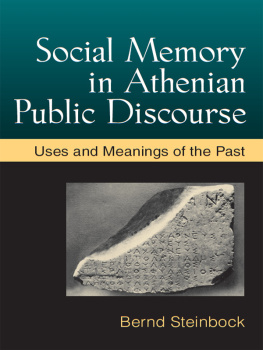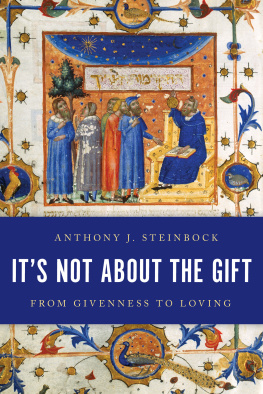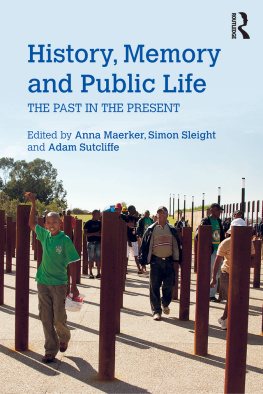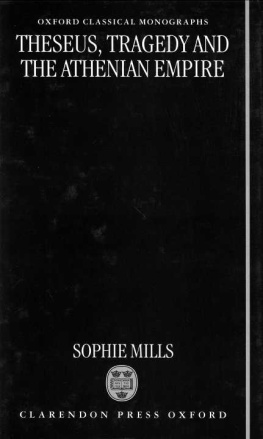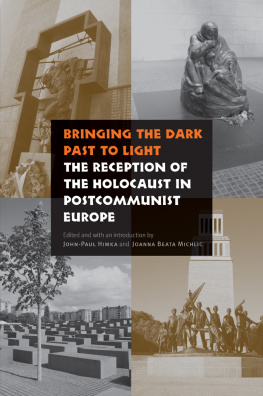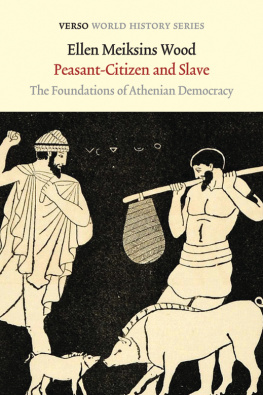Steinbock - SOCIAL MEMORY IN ATHENIAN PUBLIC DISCOURSE: uses and meanings of the past
Here you can read online Steinbock - SOCIAL MEMORY IN ATHENIAN PUBLIC DISCOURSE: uses and meanings of the past full text of the book (entire story) in english for free. Download pdf and epub, get meaning, cover and reviews about this ebook. year: 2020, publisher: University of Michigan Press, genre: Religion. Description of the work, (preface) as well as reviews are available. Best literature library LitArk.com created for fans of good reading and offers a wide selection of genres:
Romance novel
Science fiction
Adventure
Detective
Science
History
Home and family
Prose
Art
Politics
Computer
Non-fiction
Religion
Business
Children
Humor
Choose a favorite category and find really read worthwhile books. Enjoy immersion in the world of imagination, feel the emotions of the characters or learn something new for yourself, make an fascinating discovery.
SOCIAL MEMORY IN ATHENIAN PUBLIC DISCOURSE: uses and meanings of the past: summary, description and annotation
We offer to read an annotation, description, summary or preface (depends on what the author of the book "SOCIAL MEMORY IN ATHENIAN PUBLIC DISCOURSE: uses and meanings of the past" wrote himself). If you haven't found the necessary information about the book — write in the comments, we will try to find it.
Steinbock: author's other books
Who wrote SOCIAL MEMORY IN ATHENIAN PUBLIC DISCOURSE: uses and meanings of the past? Find out the surname, the name of the author of the book and a list of all author's works by series.
SOCIAL MEMORY IN ATHENIAN PUBLIC DISCOURSE: uses and meanings of the past — read online for free the complete book (whole text) full work
Below is the text of the book, divided by pages. System saving the place of the last page read, allows you to conveniently read the book "SOCIAL MEMORY IN ATHENIAN PUBLIC DISCOURSE: uses and meanings of the past" online for free, without having to search again every time where you left off. Put a bookmark, and you can go to the page where you finished reading at any time.
Font size:
Interval:
Bookmark:

Copyright by the University of Michigan 2013
All rights reserved
This book may not be reproduced, in whole or in part, including illustrations, in any form (beyond that copying permitted by Sections 107 and 108 of the U.S. Copyright Law and except by reviewers for the public press), without written permission from the publisher.
Published in the United States of America by
The University of Michigan Press
Manufactured in the United States of America Printed on acid-free paper
Printed on acid-free paper
2016 2015 2014 2013 4 3 2 1
A CIP catalog record for this book is available from the British Library.
Library of Congress Cataloging-in-Publication Data
Steinbock, Bernd.
Social memory in Athenian public discourse : uses and meanings of the past / Bernd Steinbock.
p. cm.
Includes bibliographical references and index.
ISBN 978-0-472-11832-8 (cloth : acid-free paper)
ISBN 978-0-472-02841-2 (e-book)
1. Athens (Greece)RelationsGreeceThebes. 2. Thebes (Greece)RelationsGreeceAthens. 3. Thebes (Greece)Foreign public opinion. 4. MemorySocial aspectsGreeceAthensHistoryTo 1500. 5. Collective memoryGreeceAthensHistoryTo 1500. 6. HistoriographySocial aspectsGreeceAthensHistoryTo 1500. 7. Discourse analysisGreeceAthensHistoryTo 1500. 8. Athens (Greece)Politics and government. 9. Athens (Greece)Social life and customs. 10. GreeceHistoryTo 146 B.C. I. Title.
DF285.S74 2012
303.48'23850384dc23 2012033643
For
Kathryn, Maximilian, Kunigunde, & Wenzel
Prompted by the abundant historical allusions in Athenian political and diplomatic discourse, this book analyzes the uses and meanings of the past in fourth-century Athens, using Thebes' role in Athenian memory as a case study. It explores how Athenians learned about their past and what this past meant to them. It examines how individual speakers operated within this complex memorial framework and to what extent these shared images of the past influenced the decision-making process in fourth-century Athens, where a free citizenry publically debated its foreign and domestic policies in the assembly, the law courts, and other democratic institutions. This study is based on the premise that Athenian social memory, that is, the shared and often idealized and distorted image of the past, should be viewed not as an unreliable counterpart of history but as an invaluable key to the Athenians' mentality. Against the tendency of viewing the orators' references to the past as empty rhetorical phrases or propagandistic cover-ups for Realpolitik, it argues that the past constituted important political capital in its own right. Integrating literary, epigraphic, and archaeological evidence with recent scholarship on memory, identity, rhetoric, and international relations, it contextualizes the orators' historical allusions within the complex net of remembrances and beliefs held by the audience and thus tries to gauge their ideological and emotive power.
The concept of social memory is a very useful analytical tool, since it allows viewing the manifestation and transmission of a shared image of the past as a dynamic process that leaves room for contestation, acknowledges the interdependence between ideology and social memory, and regards the past as a repository for future decision making. By examining various carriers of social memory, this study assesses how deeply a specific memory was rooted in Athenian historical consciousness and how persuasive it ultimately was. It explainscommon distortions in its transmission and determines the leeway orators had in departing from predominant versions. I approach these questions from two different angles. After establishing my methodological framework, I first explore thematically the different carriers of social memory available to the speakers and their audience and then turn to one exemplary case and examine the role of Thebes in Athenian social memory and public discourse. Historical references to Thebes cluster around four particular events: the mythical story of the burial of the fallen Argives, Thebes' collaboration with the Persians in 480, the Theban proposal to eradicate Athens in 404, and Theban aid to the Athenian democrats in 403. Since these collective memories were frequently evoked in debates about Athenian-Theban relations, this study will also help us to better comprehend some of the policy choices both poleis made during the fourth century BC.
Historical memory in ancient Greece continues to attract much scholarly attention. Since the completion of this manuscript, six important books have been published that share many of my concerns and engage with some of the same issues. In The Greeks and Their Past (Cambridge, 2010), Jonas Grethlein charts the field of literary memory in fifth-century Greece and, employing a phenomenological model that connects memory and temporality, examines the differences and communalities in the attitude toward the past in various poetic genres, oratory, and historiography. Peter Hunt's War, Peace, and Alliance in Demosthenes' Athens (Cambridge, 2010) uses the political speeches of the Attic orators to give us a more nuanced understanding of the complex factors that influenced Athenian foreign policy decisions. In Polis and Revolution (Cambridge, 2011), Julia Shear draws on theories of remembering and forgetting to elucidate the Athenians' responses to the oligarchic regimes of 411 and 404/3. Die griechische Welt: Erinnerungsorte der Antike (Munich, 2010) and Griechische Heiligtmer als Erinnerungsorte (Stuttgart, 2011), edited by Elke Stein-Hlkeskamp and Karl-Joachim Hlkeskamp and Matthias Haake and Michael Jung, respectively, explore the memorial functions of important physical and symbolic places in Greece as lieux de mmoire. Finally, Intentional History: Spinning Time in Ancient Greece (Stuttgart, 2010), a collection of essays edited by Lin Foxhall, Hans-Joachim Gehrke, and Nino Luraghi, studies Greek collective memory and features several papers on topics related to my monograph. Unfortunately, these studies appeared too late to be adequately taken into account in the present study.
In a book on memory, I ought not to forget to acknowledge the people who helped me along the way. This project originated during my time at the University of Michigan, where Ruth Scodel and David Potter provided the best guidance a young scholar could hope for. Ever since I met Ruth Scodel, I haveprofited from her farsighted advice, wide-ranging intellect, keen criticism, and readiness to offer help promptly whenever needed. David Potter deserves no less gratitude. From the very beginning, he has supported my work with relentless enthusiasm, astute criticism, and a formidable scholarly vision. He encouraged me to conceive of my project in much broader terms and to consider its larger implications. My work also benefited enormously from the expertise and advice provided by Susan Alcock, Ray Van Dam, and especially Sara Forsdyke, who has been an unfailing source of encouragement and support over the years. I am very grateful to the Department of Classical Studies at Michigan for providing such an intellectually stimulating environment. In particular, I would like to thank Richard Janko, Benjamin Acosta-Hughes, H. D. Cameron, Sabine MacCormack, Benjamin Fortson, Bruce Frier, Traianos Gagos, Vassilios Lambropoulos, Jim Porter, Jay Reed, Sara Ahbel-Rappe, David Phillips, Lauren Caldwell, Kendra Eshleman, Kris Fletcher, Robert Chenault, John Lobur, Jake MacPhail, Geoff Maturen, Mike Sampson, Adam Rabinowitz, Jeremy Hartnett, Patrick Hogan, Sanjaya Thakur, Nathan Bethell, Adam Kemezis, Kate Bosher, and Richard Persky.
Font size:
Interval:
Bookmark:
Similar books «SOCIAL MEMORY IN ATHENIAN PUBLIC DISCOURSE: uses and meanings of the past»
Look at similar books to SOCIAL MEMORY IN ATHENIAN PUBLIC DISCOURSE: uses and meanings of the past. We have selected literature similar in name and meaning in the hope of providing readers with more options to find new, interesting, not yet read works.
Discussion, reviews of the book SOCIAL MEMORY IN ATHENIAN PUBLIC DISCOURSE: uses and meanings of the past and just readers' own opinions. Leave your comments, write what you think about the work, its meaning or the main characters. Specify what exactly you liked and what you didn't like, and why you think so.

